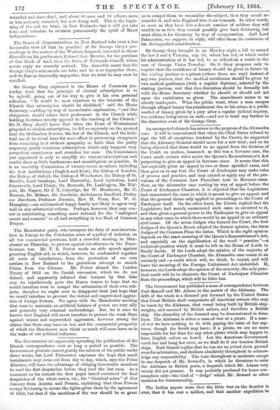Sir George Grey explained in the House of Commons yes
terday week that the principle of clerical subscription is to be upheld, going out of his way to give it his own personal adhesion. "It would ba most injurious to the interests of the Church that subscription should be abolished," said the Home
Secretary,—adding by way of inconclusive explanation, " and that
clergymen should retain their preferment in the Church while holding doctrines utterly opposed to the teaching of the Church."
Sir G. Grey should know that when the Dean of Westminster proposed to abolish subscription, he did so expressly on the ground that the Ordination Service, the law of the Church, and the habi-
tual use of its ritual have far more effect in preventing clergymen from remaining in it without sympathy or faith than the partly nugatory, partly vexatious subscription, which only hampers very scrupulous consciences and stretches lax ones. The Commission just appointed is only to simplify the various subscriptions and render them as little burdensome and unambiguous as possible. It is an unwieldy Commission of twenty-seven members, including the four Archbishops (English and Irish), the Bishop of London, the Bishop of Oxford, the Bishop of Winchester, the Bishop of St. David's, Lord Stanhope, Lord Harrowby, Lord Lyttelton, Lord Cranworth, Lord Ebury, Mr. Bouverie, Dr. Lushiugton, Mr. Wal- pole, Mr. Napier, Sir J. T. Coleridge, Sir W. Heathcote, Mr. C. Buxton, Dr. Milman, Dr. Goodwin, Archdeacon Sandford, Profes- sor Jacobson, Professor Jeremie, Rev. H. Venn, Rev. W. G. Humphry,—an ecclesiastical happy family not likely to agree very well on any substantial reform. Perhaps, however, they may con- cur in substituting something more rational for the " unfeigned assent and consent" to all and everything in the Book of Common Prayer.






























 Previous page
Previous page